|
BACKGROUND
EGYPT
RED SEA
RED SEA - PASSAGE OF
SINAI
The
full background to this teaching is available online at this link
FEAST HISTORY
|
Online links to scriptures (New International Version [NIV] unless otherwise stated) are shown in blue
| THE STORY OF TRUMPETS |
|
 A further reminder that these are potted stories not theological masterpieces! A further reminder that these are potted stories not theological masterpieces!
Knowing that the Lord was highly displeased with them, the people stripped off their remaining ornaments at Mt. Horeb as an act of contrition for what they had done, before marching on into the Desert of Sinai.
|
|
|
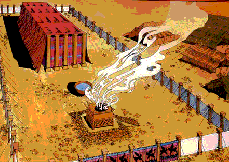 There they constructed the Tabernacle, according to the instructions the Lord had given Moses on the mountain. The Levitical priesthood too, was formed. The cloud and the fire then moved to cover the completed Tabernacle. On the 20th day of the 2nd month of the 2nd year since leaving Egypt, the cloud lifted off the Tabernacle and the people once more set off on their journey. There they constructed the Tabernacle, according to the instructions the Lord had given Moses on the mountain. The Levitical priesthood too, was formed. The cloud and the fire then moved to cover the completed Tabernacle. On the 20th day of the 2nd month of the 2nd year since leaving Egypt, the cloud lifted off the Tabernacle and the people once more set off on their journey.
Once again, the people got fed up with the hardships of travel and the boring diet. The Lord as He is wont to do, heard the people complaining and in righteous anger, set fire to the outskirts of the camp. This served to quieten them temporarily, but soon they resumed their grizzling over a lack of meat. So God inundated the people with quail to a depth of three feet (a metre) above the ground, then hit them with a severe plague. Suitably chastened, the people buried their dead here at Kibroth Hattaavah before moving on to Hazeroth. There they stayed long enough for Aaron and his sister Miriam to fall out with Moses, in a family dispute about his Cushite wife. The Lord gave Miriam leprosy, but after Moses pleaded her cause, the Lord recanted, healing her after seven days.
|
|
|
 Leaving Hazeroth, they travelled on to the Desert of Paran, from where they were finally to set out to explore the Promised Land of Canaan. The much-anticipated moment of promise was upon them. Unfortunately, but not unexpectedly, they managed to mess this up too! For Moses sent 12 men into the land to spy it out. This they did for 40 days, before returning with depressing reports full of the difficulty of taking the land from the existing settlers, who appeared so much stronger than they were. All except Caleb, that is, who was all for the expedition, because he realised they could succeed with the Lord on their side. However the people took no notice of Caleb and again rebelled, this time against Moses and Aaron, wanting now to stone them. This big time act of disobedience meant they were now in really serious trouble with the Lord, for they had rejected the very promise the Lord had brought them out of Egypt to fulfil! So rather than the people killing their leaders, the Lord gave all the men over 20, except the loyal Caleb and Joshua, a slow death sentence, accompanied by up to 40 years, not of hard labour as they deserved, but of total provision. In some ways though, the no labour would have seemed like hard labour, just wandering in the desert, not being able to claim their inheritance. None, save two, of that generation, would enter the Promised Land. After learning of their punishment, some changed their minds and decided to try to conquer the Amalekites and Canaanites anyway, but the Lord was not with them and they were soundly defeated. Leaving Hazeroth, they travelled on to the Desert of Paran, from where they were finally to set out to explore the Promised Land of Canaan. The much-anticipated moment of promise was upon them. Unfortunately, but not unexpectedly, they managed to mess this up too! For Moses sent 12 men into the land to spy it out. This they did for 40 days, before returning with depressing reports full of the difficulty of taking the land from the existing settlers, who appeared so much stronger than they were. All except Caleb, that is, who was all for the expedition, because he realised they could succeed with the Lord on their side. However the people took no notice of Caleb and again rebelled, this time against Moses and Aaron, wanting now to stone them. This big time act of disobedience meant they were now in really serious trouble with the Lord, for they had rejected the very promise the Lord had brought them out of Egypt to fulfil! So rather than the people killing their leaders, the Lord gave all the men over 20, except the loyal Caleb and Joshua, a slow death sentence, accompanied by up to 40 years, not of hard labour as they deserved, but of total provision. In some ways though, the no labour would have seemed like hard labour, just wandering in the desert, not being able to claim their inheritance. None, save two, of that generation, would enter the Promised Land. After learning of their punishment, some changed their minds and decided to try to conquer the Amalekites and Canaanites anyway, but the Lord was not with them and they were soundly defeated.
|
|
|
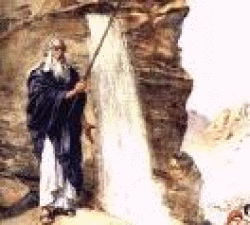 Various other misadventures befell the Israelites during their 40 years of desert wanderings, as they lived up to their now normal reputation of grizzling, disobedience and rebellion. Out of frustration with his people, Moses too, inadvertently disobeyed a command of the Lord, which sadly, cost him the opportunity to enter the Promised Land. But other victories were won when the Lord’s favour was with them, notably over the Amorites. Finally the Israelites ended up camped on the banks of the River Jordan. The Moabites, who lived across the river in Jericho, saw that the Israelites were growing in power. This frightened them. So they called in a notable prophet by the name of Balaam, who proceeded to beat up his faithful donkey three times before telling the Moabites that they were facing a lost cause. Various other misadventures befell the Israelites during their 40 years of desert wanderings, as they lived up to their now normal reputation of grizzling, disobedience and rebellion. Out of frustration with his people, Moses too, inadvertently disobeyed a command of the Lord, which sadly, cost him the opportunity to enter the Promised Land. But other victories were won when the Lord’s favour was with them, notably over the Amorites. Finally the Israelites ended up camped on the banks of the River Jordan. The Moabites, who lived across the river in Jericho, saw that the Israelites were growing in power. This frightened them. So they called in a notable prophet by the name of Balaam, who proceeded to beat up his faithful donkey three times before telling the Moabites that they were facing a lost cause.
So the Moabites and Midianites decided to get smart and use their women to seduce the Israeli men. The Jews, like many men everywhere, were receptive to these advances. The Lord again got pretty upset with this deception, sending a plague that killed 24,000 of those who had succumbed to the Moabite seducers’ charms.
As Moses neared death, Joshua was appointed and anointed by Eleazar the priest as his successor. But he still had one last battle to fight against the Midianites. Once again his troops let him down by taking the woman and boys captive, instead of killing them all, as they had been instructed. Moses had them right the situation. Without the Lord as his friend, Moses would surely have been a broken man.
The two Transjordan tribes, the Reubenites and the Gadites, decided that they did not wish to cross the River Jordan, being quite happy with the lands they already had. Moses agreed to let them stay, provided they helped the rest of the tribes in their battles for territory.
Finally came the time for Moses to die. The Lord told both Moses and Joshua that the people would rebel and eventually lose the Promised Land Joshua was about to start conquering. Quite depressing that must have been, if not entirely unexpected. Moses reminded the people of the Law, giving the Levites a copy to put beside the Ark of the Covenant, against the day they too would go astray. After blessing the people, Moses climbed up Mount Nebo, as instructed by the Lord, to view the Promised Land, and to be comforted that his successors would inhabit it. Moses died there, at age 120, being buried in an unmarked grave.
|
|
|
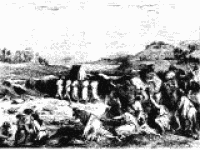 Joshua immediately took over and with youthful enthusiasm, galvanised the people into action. He quickly spent two spies out to reconnoitre Jericho. There they met the prostitute Rahab, who helped them escape the king’s clutches, in return for the sparing of her family in the coming conquest. The people then crossed the River Jordan behind the Ark of the Covenant. As the waters of the Red Sea had miraculously parted to facilitate their escape from Egypt, so the waters of the Jordan too, miraculously stopped flowing, allowing the people to cross into the Promised Land. The first step of the long and adventurous fulfilment process. Joshua immediately took over and with youthful enthusiasm, galvanised the people into action. He quickly spent two spies out to reconnoitre Jericho. There they met the prostitute Rahab, who helped them escape the king’s clutches, in return for the sparing of her family in the coming conquest. The people then crossed the River Jordan behind the Ark of the Covenant. As the waters of the Red Sea had miraculously parted to facilitate their escape from Egypt, so the waters of the Jordan too, miraculously stopped flowing, allowing the people to cross into the Promised Land. The first step of the long and adventurous fulfilment process.
|
|
|
 A memorial was erected on the bank of the Jordan to commemorate the event. Also to ‘commemorate’ the event, if that is the right word, Joshua was instructed to circumcise all the males, for circumcision had ceased when the people left Egypt. While camped at Gilgal, recovering from their surgery, the people celebrated Passover, and the next day eating some produce of the land. The manna then stopped for good. For now they were in the Promised Land. A memorial was erected on the bank of the Jordan to commemorate the event. Also to ‘commemorate’ the event, if that is the right word, Joshua was instructed to circumcise all the males, for circumcision had ceased when the people left Egypt. While camped at Gilgal, recovering from their surgery, the people celebrated Passover, and the next day eating some produce of the land. The manna then stopped for good. For now they were in the Promised Land.
|
|
|
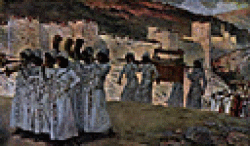 But the land was not given to them on a plate! They had to take it, with the Lord’s help and guidance. Jericho was the classic example, their first test of faith in the Lord. The army was instructed by the Lord to march round the city for six days behind the Ark of the Covenant and the priests. Seven priests were to walk in front of the Ark, blowing rams horn trumpets. On the seventh day they had to march round seven times, before sounding out a long blast on the trumpet, the signal for all the people to shout at the top of their voices. Then, and only then, would the walls fall down. The city becomes theirs. And it worked! To the surprise of many of the people too, I suspect, knowing their heritage! Rahab and her family were saved, the city conquered and razed to the ground. The people were on their way towards fulfilling God’s promise to them. But the land was not given to them on a plate! They had to take it, with the Lord’s help and guidance. Jericho was the classic example, their first test of faith in the Lord. The army was instructed by the Lord to march round the city for six days behind the Ark of the Covenant and the priests. Seven priests were to walk in front of the Ark, blowing rams horn trumpets. On the seventh day they had to march round seven times, before sounding out a long blast on the trumpet, the signal for all the people to shout at the top of their voices. Then, and only then, would the walls fall down. The city becomes theirs. And it worked! To the surprise of many of the people too, I suspect, knowing their heritage! Rahab and her family were saved, the city conquered and razed to the ground. The people were on their way towards fulfilling God’s promise to them.
|
| THE STORY OF ATONEMENT |
|
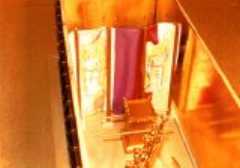 Once again, we join our potted story of God’s chosen people on their journey to possess the Promised Land. Of course, the Day of Atonement was literally that – one day annually on which all Israelites made peace with their God. However the ‘principle of Atonement’, of repentance and submission to the will of God, ideally applied then (and still does) every day of the year. Hence the relevance of the story of the gradual conquest of the Promised Land to Atonement. For as the people were obedient to God so they succeeded on the battlefield. When they didn’t follow instructions, they were defeated. So their journey was a very practical example of the necessity for the ongoing application of the principles of Atonement. Let’s see what happened. Once again, we join our potted story of God’s chosen people on their journey to possess the Promised Land. Of course, the Day of Atonement was literally that – one day annually on which all Israelites made peace with their God. However the ‘principle of Atonement’, of repentance and submission to the will of God, ideally applied then (and still does) every day of the year. Hence the relevance of the story of the gradual conquest of the Promised Land to Atonement. For as the people were obedient to God so they succeeded on the battlefield. When they didn’t follow instructions, they were defeated. So their journey was a very practical example of the necessity for the ongoing application of the principles of Atonement. Let’s see what happened.
Having taken Jericho by the sound of the trumpet, the people, under Joshua’s guidance, moved on to claim their promise. But not before having to deal with a thief named Achan. His misdemeanours resulted in an initial defeat for the Israelites at Ai, a defeat not reversed until Achan and his family were stoned to death. A salutary lesson to the people to live holy lives. Joshua emphasised this by renewing their covenant with the Lord at Mt Ebal, copying out the law and reading it out aloud to all the people, so that there could be no misunderstanding of the Lord’s requirements. Not sure how he managed it without a huge sound system, for there were very many people!
The Israelites, including Joshua, did not completely learn the lesson of totally relying on God though. For they signed a treaty, under false pretences mind you, with the Gibeonites, who they were told were from far away, but in fact were close neighbours. Like us, they forgot to ask the Lord first! Because of this treaty Joshua spared the Gibeonites, but effectively made them slaves.
|
|
|
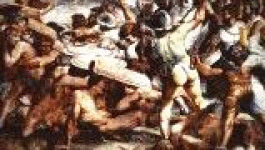 The nation experienced miracles in the defeat of the Amorites, when large hailstones killed the fleeing Amorite soldiers, with the sun supernaturally standing still for a day as a confirming sign of the Lord’s power. Both northern and southern cities were conquered, a total of thirty-one in all. The nation experienced miracles in the defeat of the Amorites, when large hailstones killed the fleeing Amorite soldiers, with the sun supernaturally standing still for a day as a confirming sign of the Lord’s power. Both northern and southern cities were conquered, a total of thirty-one in all.
|
|
|
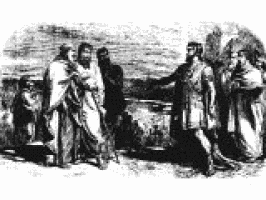 But as Joshua grew old there were still very large areas of land yet to be occupied. Joshua divided the land amongst the tribes, including an allocation to the Levites. The eastern tribes were now able to go back to their homes on the other side of the River Jordan. But as Joshua grew old there were still very large areas of land yet to be occupied. Joshua divided the land amongst the tribes, including an allocation to the Levites. The eastern tribes were now able to go back to their homes on the other side of the River Jordan.
The people then enjoyed a period of peace throughout Joshua’s old age. As Moses had done before him, when it came to Joshua’s turn to die, he farwelled the leaders and the people. He reminded them to keep the Lord’s covenant if they wished to continue to live in prosperity, under the Lord’s protection. Joshua duly died at age 110. Unlike Moses, he was buried in the Promised Land.
For the next 300 odd years, Israel was ruled, generally poorly, by a succession of Judges. They were seemingly expert at forgetting the Lord’s requirements for the living of their lives, opening the way to defeat by outside forces. This would result in desperate pleas for the Lord’s help, which the Lord generously gave. This cycle was repeated with almost monotonous regularity. An even bigger problem in the long term though, was the failure to displace the Canaanites and eliminate their pagan ways. Eventually the people foolishly adopted her ways as their own.
|
|
|
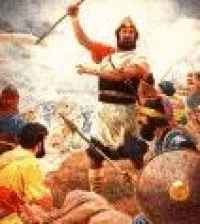 Finally getting tired of the Judges they decided, against God’s wishes, that they would rather have a king to rule them. God used the prophet Samuel to arrange this. After the Ark was captured by and regained from the Philistines, the Lord arranged for Samuel, in a somewhat circuitous way, to anoint and appoint Saul as king. Saul was the ideal profile of what a king should be – tall, handsome and a fine warrior. Just perfect, so the people thought. But he did not have a heart for God, which was to prove his undoing. After initially accepting David when he helped him tremendously by slaying the Philistine giant Goliath, Saul turned against him and tried many times to kill him. Finally getting tired of the Judges they decided, against God’s wishes, that they would rather have a king to rule them. God used the prophet Samuel to arrange this. After the Ark was captured by and regained from the Philistines, the Lord arranged for Samuel, in a somewhat circuitous way, to anoint and appoint Saul as king. Saul was the ideal profile of what a king should be – tall, handsome and a fine warrior. Just perfect, so the people thought. But he did not have a heart for God, which was to prove his undoing. After initially accepting David when he helped him tremendously by slaying the Philistine giant Goliath, Saul turned against him and tried many times to kill him.
The Lord finally rejected Saul and asked Samuel to anoint David as king. David had to go into hiding, to save his own life. But when presented with the opportunity, he refused to kill Saul, for he still regarded him as being the Lord’s anointed one. Finally the situation got so bad that David went into voluntary exile, ironically amongst the Philistines. No doubt he didn’t inform them that it was he who had killed Goliath! But, in a twist of fate, the Philistines, killed Saul in battle. David, after a series of fights with Saul’s remaining family members, became king over Israel.
And what a warrior and leader he turned out to be - well most of the time anyway! What he lacked in the kingly stature and demeanour of Saul, he made up for in one crucial way. He truly and genuinely loved his Lord, and sought his guidance on most occasions.
|
|
|
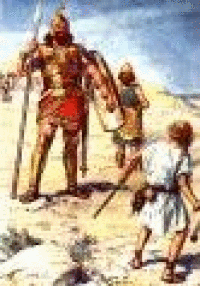 David’s life and exploits never lacked for interest and variety. He conquered Jerusalem, defeated the Philistines, and brought the Ark up to Jerusalem, offending his wife Michal, Saul’s daughter, in the process. Dancing with all his might dressed only in his undergarments, in a most ‘unkingly’ manner in front of the Ark, was just too much for her, as she had inherited her fathers lack of love for God. And that was just for starters! David’s life and exploits never lacked for interest and variety. He conquered Jerusalem, defeated the Philistines, and brought the Ark up to Jerusalem, offending his wife Michal, Saul’s daughter, in the process. Dancing with all his might dressed only in his undergarments, in a most ‘unkingly’ manner in front of the Ark, was just too much for her, as she had inherited her fathers lack of love for God. And that was just for starters!
|
|
|
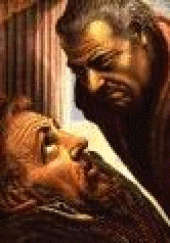 David won many famous victories, but one year got a little tired and stayed behind in the comfort of his palace, instead of going out to battleground with his troops. His adultery with Bathsheba, her pregnancy and the subsequent murder of her husband were the result. However, after being rebuked by the prophet Nathan (pictured), David fell upon the Lord’s mercy and was forgiven. Although that baby died, Bathsheba did go on to be the mother of Solomon, the Lord’s chosen successor. David won many famous victories, but one year got a little tired and stayed behind in the comfort of his palace, instead of going out to battleground with his troops. His adultery with Bathsheba, her pregnancy and the subsequent murder of her husband were the result. However, after being rebuked by the prophet Nathan (pictured), David fell upon the Lord’s mercy and was forgiven. Although that baby died, Bathsheba did go on to be the mother of Solomon, the Lord’s chosen successor.
David also had considerable family problems, arising from being too lax in the discipline of his sons. This led to incest and retributive murder, then pride getting in the way of reconciliation with his oldest son Absalom. This finally resulted in an attempted coup by Absalom, during which David had to flee for his life. Never a dull moment in David’s family! After Absalom’s death, David returned to Jerusalem, sorely grieving for his son, no doubt blaming himself for what had happened. That’s the sort of person David was.
|
|
|
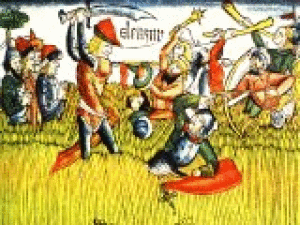 Other troubles arose within his kingdom, but throughout his life, he never failed to praise and glorify his God. A lesson for us all! Probably his biggest disappointment though, was not being allowed to build God’s Temple. Because of David’s warrior lifestyle, the Lord reserved that privilege for his son, Solomon. Other troubles arose within his kingdom, but throughout his life, he never failed to praise and glorify his God. A lesson for us all! Probably his biggest disappointment though, was not being allowed to build God’s Temple. Because of David’s warrior lifestyle, the Lord reserved that privilege for his son, Solomon.
David, even with his dying words, praised his God. For the Lord was the consuming passion of his life. He had lived by far the majority of his life in a righteous manner. We just remember the mistakes! Still happens today too! But the Lord blessed him and Israel throughout his reign, and he was able to leave Solomon a full, powerful and united kingdom as his inheritance.
|
| THE STORY OF TABERNACLES |
|
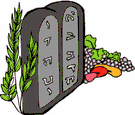 Now for the final instalment of our story about the journey of God’s people to possess the Promised Land. Now for the final instalment of our story about the journey of God’s people to possess the Promised Land.
|
|
|
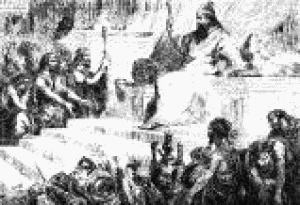 With the ascension of King Solomon to the throne of Israel, came the period of prosperity and influence that Moses and the people who escaped from the tyrannies of the Egyptians dreamed about, and could well have experienced earlier, had they not been disobedient. Instead, the Israelites had to wait from c.1446BC until the reign of Solomon, from 970 – 930BC, to fully realise God’s promise. With the ascension of King Solomon to the throne of Israel, came the period of prosperity and influence that Moses and the people who escaped from the tyrannies of the Egyptians dreamed about, and could well have experienced earlier, had they not been disobedient. Instead, the Israelites had to wait from c.1446BC until the reign of Solomon, from 970 – 930BC, to fully realise God’s promise.
As was usual for the times, Solomon’s succession to the throne was not simple. His half brother Adonijah set himself up as king before King David died, but David put a stop to that. Solomon treated Adonijah leniently that time, but not so later when he tried to take his throne away by subterfuge. Solomon also prematurely ended the lives of Joab, David’s Commander-in-Chief, and Shimei for siding with Adonijah. Another traitor, Abiathar, was defrocked from the priesthood, his life spared only because of his close relationship with Solomon’s father, King David, and because he had carried the Ark. Through this bloody ‘sorting out’ the kingdom was made secure.
|
|
|
 After making a peace treaty with Egypt, Solomon married the Pharaoh’s daughter, in so doing developing a taste for foreign women. He also worshipped at the high places in Gibeon. These two areas of sin later led to his downfall. After making a peace treaty with Egypt, Solomon married the Pharaoh’s daughter, in so doing developing a taste for foreign women. He also worshipped at the high places in Gibeon. These two areas of sin later led to his downfall.
Solomon's Idolatory pictured.
|
|
|
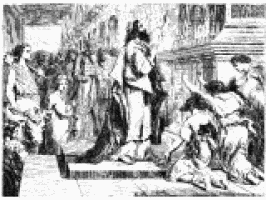 While at Gibeon, Solomon asked the Lord for wisdom, which greatly pleased the Lord. He became renowned for his wisdom in the known world. However the two sides of Solomon’s character were soon to be illustrated again. He built God’s temple in seven years but took thirteen years over building his palace. The Temple was absolutely magnificent, the inside being covered with pure gold, a building like no other, before or since. The building work was probably completed late, in the eighth month of the religious year, but most significantly, the Ark of the Covenant, which contained God’s presence, was not placed in the Sanctuary until eleven months later, during the Feast of Tabernacles. The Lord’s glory filled the Tabernacle after the priests withdrew. Solomon prayers of dedication were followed by the sacrifice of 22,000 cattle and 120,000 sheep and goats! While at Gibeon, Solomon asked the Lord for wisdom, which greatly pleased the Lord. He became renowned for his wisdom in the known world. However the two sides of Solomon’s character were soon to be illustrated again. He built God’s temple in seven years but took thirteen years over building his palace. The Temple was absolutely magnificent, the inside being covered with pure gold, a building like no other, before or since. The building work was probably completed late, in the eighth month of the religious year, but most significantly, the Ark of the Covenant, which contained God’s presence, was not placed in the Sanctuary until eleven months later, during the Feast of Tabernacles. The Lord’s glory filled the Tabernacle after the priests withdrew. Solomon prayers of dedication were followed by the sacrifice of 22,000 cattle and 120,000 sheep and goats!
The Lord though, was still not happy with Solomon. For after he had completed building both the Temple and his palace, the Lord spoke again in a dream to him, warning him of the consequences of worshipping other Gods. Solomon’s major projects were built with conscripted, forced labour, for Israel was the strongest power in the area.
|
|
|
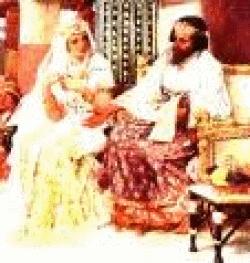 The kingdom prospered for a time, Solomon’s splendour being world-renowned. The visiting Queen of Sheba was indeed overwhelmed by it all. This period saw the height of the glory of the Promised Land. The natural type of the Feast of Tabernacles was fulfilled. The kingdom prospered for a time, Solomon’s splendour being world-renowned. The visiting Queen of Sheba was indeed overwhelmed by it all. This period saw the height of the glory of the Promised Land. The natural type of the Feast of Tabernacles was fulfilled.
Unfortunately, as so often in the past, the Israelites journey did not have a “lived happily ever after†ending. But that is another story…..
|
| <i>NEXT WEEK</i> |
|
 We start a new 10-part (our longest yet) series on the exciting Autumn Feasts. These represent the times in which we now live and what we can look forward to in the future. We start a new 10-part (our longest yet) series on the exciting Autumn Feasts. These represent the times in which we now live and what we can look forward to in the future.
Promise you won't be bored!
|
| A NOTE FROM DAVID |
|
 I trust you have enjoyed our walk back in time to envisage what life may have been like way back then. Hope too, that it has helped your understanding of biblical happenings, or at least, make you want to search out more! I trust you have enjoyed our walk back in time to envisage what life may have been like way back then. Hope too, that it has helped your understanding of biblical happenings, or at least, make you want to search out more!
this week's picture is again from Kenya. What I wanted to draw your attention to is the ribbons being waved by the young man in front. These are very similar to those used for worship in the Tabernacle and Temple.
How does he come to have them? That is another story...
|
So until next week.......
MAY GOD BLESS YOU AND YOU BLESS GOD!
His servant and yours

Learn more about us at...
www.wwj.org.nz/about.php
|
A DAVID'S DOODLING
484. The foolish man lusts after instant pleasure, the wise man seeks knowledge, but the godly man yearns for God's truth.
David Tait
|
Check
out the WWJ website for….
More David's Doodlings: www.wwj.org.nz/dd.php
Reports on past Ministry visits: http://www.wwj.org.nz/diary.php
Eagles Fly High!: http://www.wwj.org.nz/eagle.php
Eagles Fly High! (Pastors, Teachers and Students): http://www.wwj.org.nz/eaglepts.php
God Facts (A mine of information): http://www.wwj.org.nz/gfacts.php
|

 A further reminder that these are potted stories not theological masterpieces!
A further reminder that these are potted stories not theological masterpieces! There they constructed the Tabernacle, according to the instructions the Lord had given Moses on the mountain. The Levitical priesthood too, was formed. The cloud and the fire then moved to cover the completed Tabernacle. On the 20th day of the 2nd month of the 2nd year since leaving Egypt, the cloud lifted off the Tabernacle and the people once more set off on their journey.
There they constructed the Tabernacle, according to the instructions the Lord had given Moses on the mountain. The Levitical priesthood too, was formed. The cloud and the fire then moved to cover the completed Tabernacle. On the 20th day of the 2nd month of the 2nd year since leaving Egypt, the cloud lifted off the Tabernacle and the people once more set off on their journey.  Leaving Hazeroth, they travelled on to the Desert of Paran, from where they were finally to set out to explore the Promised Land of Canaan. The much-anticipated moment of promise was upon them. Unfortunately, but not unexpectedly, they managed to mess this up too! For Moses sent 12 men into the land to spy it out. This they did for 40 days, before returning with depressing reports full of the difficulty of taking the land from the existing settlers, who appeared so much stronger than they were. All except Caleb, that is, who was all for the expedition, because he realised they could succeed with the Lord on their side. However the people took no notice of Caleb and again rebelled, this time against Moses and Aaron, wanting now to stone them. This big time act of disobedience meant they were now in really serious trouble with the Lord, for they had rejected the very promise the Lord had brought them out of Egypt to fulfil! So rather than the people killing their leaders, the Lord gave all the men over 20, except the loyal Caleb and Joshua, a slow death sentence, accompanied by up to 40 years, not of hard labour as they deserved, but of total provision. In some ways though, the no labour would have seemed like hard labour, just wandering in the desert, not being able to claim their inheritance. None, save two, of that generation, would enter the Promised Land. After learning of their punishment, some changed their minds and decided to try to conquer the Amalekites and Canaanites anyway, but the Lord was not with them and they were soundly defeated.
Leaving Hazeroth, they travelled on to the Desert of Paran, from where they were finally to set out to explore the Promised Land of Canaan. The much-anticipated moment of promise was upon them. Unfortunately, but not unexpectedly, they managed to mess this up too! For Moses sent 12 men into the land to spy it out. This they did for 40 days, before returning with depressing reports full of the difficulty of taking the land from the existing settlers, who appeared so much stronger than they were. All except Caleb, that is, who was all for the expedition, because he realised they could succeed with the Lord on their side. However the people took no notice of Caleb and again rebelled, this time against Moses and Aaron, wanting now to stone them. This big time act of disobedience meant they were now in really serious trouble with the Lord, for they had rejected the very promise the Lord had brought them out of Egypt to fulfil! So rather than the people killing their leaders, the Lord gave all the men over 20, except the loyal Caleb and Joshua, a slow death sentence, accompanied by up to 40 years, not of hard labour as they deserved, but of total provision. In some ways though, the no labour would have seemed like hard labour, just wandering in the desert, not being able to claim their inheritance. None, save two, of that generation, would enter the Promised Land. After learning of their punishment, some changed their minds and decided to try to conquer the Amalekites and Canaanites anyway, but the Lord was not with them and they were soundly defeated.  Various other misadventures befell the Israelites during their 40 years of desert wanderings, as they lived up to their now normal reputation of grizzling, disobedience and rebellion. Out of frustration with his people, Moses too, inadvertently disobeyed a command of the Lord, which sadly, cost him the opportunity to enter the Promised Land. But other victories were won when the Lord’s favour was with them, notably over the Amorites. Finally the Israelites ended up camped on the banks of the River Jordan. The Moabites, who lived across the river in Jericho, saw that the Israelites were growing in power. This frightened them. So they called in a notable prophet by the name of Balaam, who proceeded to beat up his faithful donkey three times before telling the Moabites that they were facing a lost cause.
Various other misadventures befell the Israelites during their 40 years of desert wanderings, as they lived up to their now normal reputation of grizzling, disobedience and rebellion. Out of frustration with his people, Moses too, inadvertently disobeyed a command of the Lord, which sadly, cost him the opportunity to enter the Promised Land. But other victories were won when the Lord’s favour was with them, notably over the Amorites. Finally the Israelites ended up camped on the banks of the River Jordan. The Moabites, who lived across the river in Jericho, saw that the Israelites were growing in power. This frightened them. So they called in a notable prophet by the name of Balaam, who proceeded to beat up his faithful donkey three times before telling the Moabites that they were facing a lost cause.  Joshua immediately took over and with youthful enthusiasm, galvanised the people into action. He quickly spent two spies out to reconnoitre Jericho. There they met the prostitute Rahab, who helped them escape the king’s clutches, in return for the sparing of her family in the coming conquest. The people then crossed the River Jordan behind the Ark of the Covenant. As the waters of the Red Sea had miraculously parted to facilitate their escape from Egypt, so the waters of the Jordan too, miraculously stopped flowing, allowing the people to cross into the Promised Land. The first step of the long and adventurous fulfilment process.
Joshua immediately took over and with youthful enthusiasm, galvanised the people into action. He quickly spent two spies out to reconnoitre Jericho. There they met the prostitute Rahab, who helped them escape the king’s clutches, in return for the sparing of her family in the coming conquest. The people then crossed the River Jordan behind the Ark of the Covenant. As the waters of the Red Sea had miraculously parted to facilitate their escape from Egypt, so the waters of the Jordan too, miraculously stopped flowing, allowing the people to cross into the Promised Land. The first step of the long and adventurous fulfilment process.  A memorial was erected on the bank of the Jordan to commemorate the event. Also to ‘commemorate’ the event, if that is the right word, Joshua was instructed to circumcise all the males, for circumcision had ceased when the people left Egypt. While camped at Gilgal, recovering from their surgery, the people celebrated Passover, and the next day eating some produce of the land. The manna then stopped for good. For now they were in the Promised Land.
A memorial was erected on the bank of the Jordan to commemorate the event. Also to ‘commemorate’ the event, if that is the right word, Joshua was instructed to circumcise all the males, for circumcision had ceased when the people left Egypt. While camped at Gilgal, recovering from their surgery, the people celebrated Passover, and the next day eating some produce of the land. The manna then stopped for good. For now they were in the Promised Land.  But the land was not given to them on a plate! They had to take it, with the Lord’s help and guidance. Jericho was the classic example, their first test of faith in the Lord. The army was instructed by the Lord to march round the city for six days behind the Ark of the Covenant and the priests. Seven priests were to walk in front of the Ark, blowing rams horn trumpets. On the seventh day they had to march round seven times, before sounding out a long blast on the trumpet, the signal for all the people to shout at the top of their voices. Then, and only then, would the walls fall down. The city becomes theirs. And it worked! To the surprise of many of the people too, I suspect, knowing their heritage! Rahab and her family were saved, the city conquered and razed to the ground. The people were on their way towards fulfilling God’s promise to them.
But the land was not given to them on a plate! They had to take it, with the Lord’s help and guidance. Jericho was the classic example, their first test of faith in the Lord. The army was instructed by the Lord to march round the city for six days behind the Ark of the Covenant and the priests. Seven priests were to walk in front of the Ark, blowing rams horn trumpets. On the seventh day they had to march round seven times, before sounding out a long blast on the trumpet, the signal for all the people to shout at the top of their voices. Then, and only then, would the walls fall down. The city becomes theirs. And it worked! To the surprise of many of the people too, I suspect, knowing their heritage! Rahab and her family were saved, the city conquered and razed to the ground. The people were on their way towards fulfilling God’s promise to them.  Once again, we join our potted story of God’s chosen people on their journey to possess the Promised Land. Of course, the Day of Atonement was literally that – one day annually on which all Israelites made peace with their God. However the ‘principle of Atonement’, of repentance and submission to the will of God, ideally applied then (and still does) every day of the year. Hence the relevance of the story of the gradual conquest of the Promised Land to Atonement. For as the people were obedient to God so they succeeded on the battlefield. When they didn’t follow instructions, they were defeated. So their journey was a very practical example of the necessity for the ongoing application of the principles of Atonement. Let’s see what happened.
Once again, we join our potted story of God’s chosen people on their journey to possess the Promised Land. Of course, the Day of Atonement was literally that – one day annually on which all Israelites made peace with their God. However the ‘principle of Atonement’, of repentance and submission to the will of God, ideally applied then (and still does) every day of the year. Hence the relevance of the story of the gradual conquest of the Promised Land to Atonement. For as the people were obedient to God so they succeeded on the battlefield. When they didn’t follow instructions, they were defeated. So their journey was a very practical example of the necessity for the ongoing application of the principles of Atonement. Let’s see what happened. The nation experienced miracles in the defeat of the Amorites, when large hailstones killed the fleeing Amorite soldiers, with the sun supernaturally standing still for a day as a confirming sign of the Lord’s power. Both northern and southern cities were conquered, a total of thirty-one in all.
The nation experienced miracles in the defeat of the Amorites, when large hailstones killed the fleeing Amorite soldiers, with the sun supernaturally standing still for a day as a confirming sign of the Lord’s power. Both northern and southern cities were conquered, a total of thirty-one in all.  But as Joshua grew old there were still very large areas of land yet to be occupied. Joshua divided the land amongst the tribes, including an allocation to the Levites. The eastern tribes were now able to go back to their homes on the other side of the River Jordan.
But as Joshua grew old there were still very large areas of land yet to be occupied. Joshua divided the land amongst the tribes, including an allocation to the Levites. The eastern tribes were now able to go back to their homes on the other side of the River Jordan.  Finally getting tired of the Judges they decided, against God’s wishes, that they would rather have a king to rule them. God used the prophet Samuel to arrange this. After the Ark was captured by and regained from the Philistines, the Lord arranged for Samuel, in a somewhat circuitous way, to anoint and appoint Saul as king. Saul was the ideal profile of what a king should be – tall, handsome and a fine warrior. Just perfect, so the people thought. But he did not have a heart for God, which was to prove his undoing. After initially accepting David when he helped him tremendously by slaying the Philistine giant Goliath, Saul turned against him and tried many times to kill him.
Finally getting tired of the Judges they decided, against God’s wishes, that they would rather have a king to rule them. God used the prophet Samuel to arrange this. After the Ark was captured by and regained from the Philistines, the Lord arranged for Samuel, in a somewhat circuitous way, to anoint and appoint Saul as king. Saul was the ideal profile of what a king should be – tall, handsome and a fine warrior. Just perfect, so the people thought. But he did not have a heart for God, which was to prove his undoing. After initially accepting David when he helped him tremendously by slaying the Philistine giant Goliath, Saul turned against him and tried many times to kill him.  David’s life and exploits never lacked for interest and variety. He conquered Jerusalem, defeated the Philistines, and brought the Ark up to Jerusalem, offending his wife Michal, Saul’s daughter, in the process. Dancing with all his might dressed only in his undergarments, in a most ‘unkingly’ manner in front of the Ark, was just too much for her, as she had inherited her fathers lack of love for God. And that was just for starters!
David’s life and exploits never lacked for interest and variety. He conquered Jerusalem, defeated the Philistines, and brought the Ark up to Jerusalem, offending his wife Michal, Saul’s daughter, in the process. Dancing with all his might dressed only in his undergarments, in a most ‘unkingly’ manner in front of the Ark, was just too much for her, as she had inherited her fathers lack of love for God. And that was just for starters!  David won many famous victories, but one year got a little tired and stayed behind in the comfort of his palace, instead of going out to battleground with his troops. His adultery with Bathsheba, her pregnancy and the subsequent murder of her husband were the result. However, after being rebuked by the prophet Nathan (pictured), David fell upon the Lord’s mercy and was forgiven. Although that baby died, Bathsheba did go on to be the mother of Solomon, the Lord’s chosen successor.
David won many famous victories, but one year got a little tired and stayed behind in the comfort of his palace, instead of going out to battleground with his troops. His adultery with Bathsheba, her pregnancy and the subsequent murder of her husband were the result. However, after being rebuked by the prophet Nathan (pictured), David fell upon the Lord’s mercy and was forgiven. Although that baby died, Bathsheba did go on to be the mother of Solomon, the Lord’s chosen successor.  Other troubles arose within his kingdom, but throughout his life, he never failed to praise and glorify his God. A lesson for us all! Probably his biggest disappointment though, was not being allowed to build God’s Temple. Because of David’s warrior lifestyle, the Lord reserved that privilege for his son, Solomon.
Other troubles arose within his kingdom, but throughout his life, he never failed to praise and glorify his God. A lesson for us all! Probably his biggest disappointment though, was not being allowed to build God’s Temple. Because of David’s warrior lifestyle, the Lord reserved that privilege for his son, Solomon.  Now for the final instalment of our story about the journey of God’s people to possess the Promised Land.
Now for the final instalment of our story about the journey of God’s people to possess the Promised Land.  With the ascension of King Solomon to the throne of Israel, came the period of prosperity and influence that Moses and the people who escaped from the tyrannies of the Egyptians dreamed about, and could well have experienced earlier, had they not been disobedient. Instead, the Israelites had to wait from c.1446BC until the reign of Solomon, from 970 – 930BC, to fully realise God’s promise.
With the ascension of King Solomon to the throne of Israel, came the period of prosperity and influence that Moses and the people who escaped from the tyrannies of the Egyptians dreamed about, and could well have experienced earlier, had they not been disobedient. Instead, the Israelites had to wait from c.1446BC until the reign of Solomon, from 970 – 930BC, to fully realise God’s promise.  After making a peace treaty with Egypt, Solomon married the Pharaoh’s daughter, in so doing developing a taste for foreign women. He also worshipped at the high places in Gibeon. These two areas of sin later led to his downfall.
After making a peace treaty with Egypt, Solomon married the Pharaoh’s daughter, in so doing developing a taste for foreign women. He also worshipped at the high places in Gibeon. These two areas of sin later led to his downfall.  While at Gibeon, Solomon asked the Lord for wisdom, which greatly pleased the Lord. He became renowned for his wisdom in the known world. However the two sides of Solomon’s character were soon to be illustrated again. He built God’s temple in seven years but took thirteen years over building his palace. The Temple was absolutely magnificent, the inside being covered with pure gold, a building like no other, before or since. The building work was probably completed late, in the eighth month of the religious year, but most significantly, the Ark of the Covenant, which contained God’s presence, was not placed in the Sanctuary until eleven months later, during the Feast of Tabernacles. The Lord’s glory filled the Tabernacle after the priests withdrew. Solomon prayers of dedication were followed by the sacrifice of 22,000 cattle and 120,000 sheep and goats!
While at Gibeon, Solomon asked the Lord for wisdom, which greatly pleased the Lord. He became renowned for his wisdom in the known world. However the two sides of Solomon’s character were soon to be illustrated again. He built God’s temple in seven years but took thirteen years over building his palace. The Temple was absolutely magnificent, the inside being covered with pure gold, a building like no other, before or since. The building work was probably completed late, in the eighth month of the religious year, but most significantly, the Ark of the Covenant, which contained God’s presence, was not placed in the Sanctuary until eleven months later, during the Feast of Tabernacles. The Lord’s glory filled the Tabernacle after the priests withdrew. Solomon prayers of dedication were followed by the sacrifice of 22,000 cattle and 120,000 sheep and goats!  The kingdom prospered for a time, Solomon’s splendour being world-renowned. The visiting Queen of Sheba was indeed overwhelmed by it all. This period saw the height of the glory of the Promised Land. The natural type of the Feast of Tabernacles was fulfilled.
The kingdom prospered for a time, Solomon’s splendour being world-renowned. The visiting Queen of Sheba was indeed overwhelmed by it all. This period saw the height of the glory of the Promised Land. The natural type of the Feast of Tabernacles was fulfilled.  We start a new 10-part (our longest yet) series on the exciting Autumn Feasts. These represent the times in which we now live and what we can look forward to in the future.
We start a new 10-part (our longest yet) series on the exciting Autumn Feasts. These represent the times in which we now live and what we can look forward to in the future. I trust you have enjoyed our walk back in time to envisage what life may have been like way back then. Hope too, that it has helped your understanding of biblical happenings, or at least, make you want to search out more!
I trust you have enjoyed our walk back in time to envisage what life may have been like way back then. Hope too, that it has helped your understanding of biblical happenings, or at least, make you want to search out more!